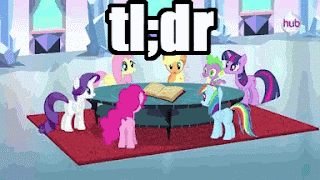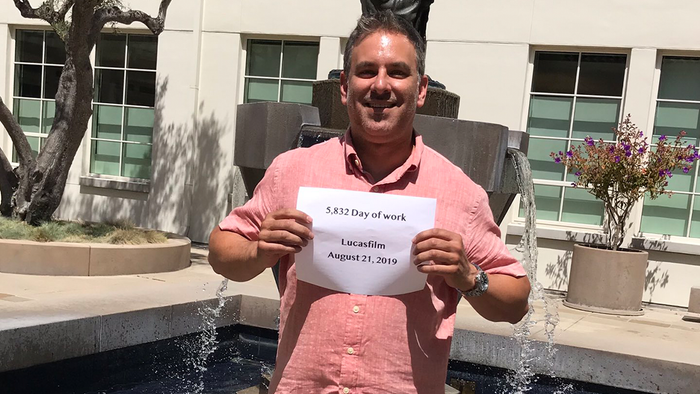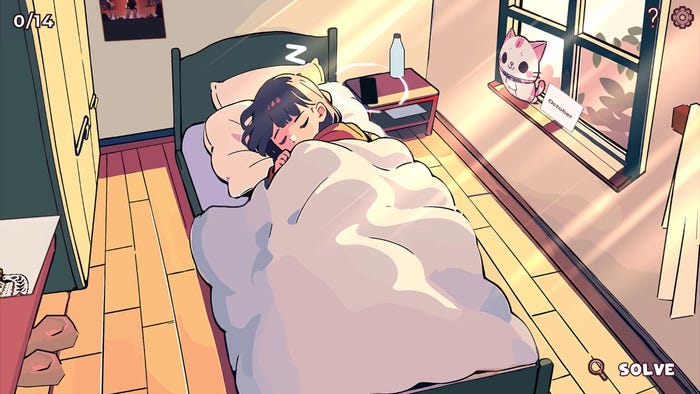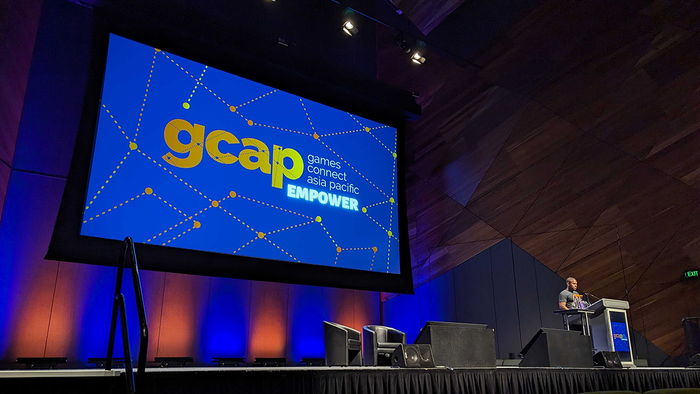
Featured Blog | This community-written post highlights the best of what the game industry has to offer. Read more like it on the Game Developer Blogs.
A Very Long Post About How to Become a Creator.
My advice for young people who want to become creators of video games (or any other craft, really), based on my 20+ years in the wilderness of the industry. It is advice in a blog post and therefore to be considered dubious until proven otherwise.

|
Even by my wordy standards, this page is super TL;DR. I suggest just reading it until I get to the bit where I plug my new game. |
It has come to my attention that quite a few young, aspirant creators find my opinions to be of value when it comes to making a career in the game industry.
It's true, and it terrifies me.
Kids, most mornings I don't know whether to crap or wind my watch. (You used to have to wind up watches. Also, people used to wear watches.) My own kids don't pay any attention to me. I see no reason why you should. If I'm so smart, why am I old?
But I do get asked for advice about making a career as a game developer. A LOT. And some questions come up again and again. So I’m writing an answer to the question. I know it is hopelessly, bone-jarringly arrogant for me to do something like this, but I wanted to put my answer on one web page so I can send them here.
These are the answers that worked for me. Your answers will definitely be different. But still, this is a set of possible answers.
(Also, I have a new RPG, Avadon 3: The Warborn, to promote. I need to get it attention to buy food for my kids. Sorry. That’s how the sausage is made.)
As a bonus, much of this advice also applies to other fields. This blogpostlet might be useful if you want to be a writer, or a comedian, or a sculptor, or make naughty needlepoint.
Much of it is focused on encouraging you to actually create something, by yourself or in a small group. There's a reason for this: If you want a real job in AAA gaming, the best way to get it is to have a portfolio to show them. Being able to point at something and say, "See? I made that!" is a huge advantage, if not a necessity.
Here are five bits of advice, elaborated in my trademark snarky, excessively-worded style. Each bit of advice comes with an exercise for you, the aspirant. Do not skip the exercises. They are more important than the advice.
|
This person took my artistic advice once. Then he embarked upon a memorable career in hotel management. |
Disclaimer
This is MY advice. Mine. It is what worked for ME.
My advice is mostly oft-repeated cliches, written thousands of times already by more attractive people. My advice may not help you. It may, in fact, harm you. Do not use my advice without consultation with a physician.
A young lad in Dublin tried my advice, and he came down with simultaneous scurvy and rickets. He travels with the circus now. For four shillings, they'll let you poke him with a stick.
This advice is worth what you paid for it. Opinions are like assholes: Everybody has one.
That said, let's begin.
|
When you make 1000 things, make sure you make 1000 different things, not the same thing 1000 times. |
Advice #1: Make Games.
"Eighty percent of success is showing up." - Woody Allen
If you want to make games, make games. You don't need permission. If you want to make board games, make them. If you want to make computer games, learn a programming language. Or learn GameMaker, or RPG Maker, or Twine. No wrong answers.
Or mod one of the many video games that are moddable. Again, you don't need permission. You can make a Skyrim dungeon and upload it and people will play it and let you know what they think, and this is amazing.
Once you have a game/mod/whatever, show it to anyone who will look at it. Get their feedback, and LISTEN TO IT. More specifically, listen when they say, "I liked this," or "This confused me," or "This made me want to quit." They will also give you advice for how to fix the problem. Ignore it. They're not the creator; you are. Just listen to how your work affected them. That is the precious feedback.
Then make another thing. And another. This is a very difficult craft to learn, and you will have to spend a lot of time and endure a lot of failure. In the end, the only way to ever learn how to make games (or sculpt, or write plays, or knit) is to do it. (It's the same for everything else. Want to be a carpenter? You'll have to saw a lot of wood.)
If your job and/or kids keep you too busy to do this, please believe me when I say you have my sympathy. Look at the bright side. At least you have a job and/or kids.
(Note that I am not saying, as some do, “You must create EVERY DAY or you FAIL.” You’ll probably need to take breaks sometimes. Just remember that, whenever you put the weight down, you do have to pick it up again eventually.)
It is sometimes possible to make a mod or adventure for a game so good that some company will just up and notice you and offer you a job. It has happened. Good, dedicated, serious talent is rare and valuable. (Warning: The quality bar for this is VERY HIGH. Yet, your goal is to be that good. That is what you are working toward.)
Exercise #1:
You should have these things around your home: A chess set. Checkers. A pair of dice. A deck of cards (any set of cards, from any game, even Candyland). Paper and a pencil.
Use some or all of these components to make a game. (If this exercise is too wide open, try using these materials to make a game where the players are trying to win a race. Limitations aid creativity.)
Teach the game to someone else. Play it 2 or 3 times.
If you want to create something (a game, a story, an earwax sculpture), and you've never tried to create that thing, STOP READING. GO DO IT. NOW. NO EXCUSES. YOUR LIFESPAN IS LIMITED, AND YOU WILL BE DEAD SOMEDAY! GO! You'll learn more from an hour of creating than from reading a thousand blog posts. This article will still be here when you're done, and blogs are dumb.
|
Real artists ship. Heck, I once had a big success with a game that looks like this! |
Advice #2: Play Games. Thoughtfully.
If you want to excel in some art form, it is extremely valuable to be very familiar with that art form. Play games. A lot. Experience it. Know the history of your craft. Know how it developed and the mistakes and clever inventions people made along the way. The more you know, the more tools you will have in your happy little toolbox.
This is meant to be work. Playing one game fifty hours is fun. Playing fifty games of different genres and styles, for one hour each, is work. Really picking them apart and figuring out what worked, why it worked, what didn't work, and why it didn't work, requires effort and concentration.
It also provides an invaluable education, and you don't need to pay one penny beyond the cost of the games to get it. With freemium titles, bundles, and Steam sales, you get honestly get a ton of games (and thus a ton of education) for really cheap.
Exercise #2:
Think back to the last 3 (or more) games you played for more than ten minutes. For each one, come up with a list of three SPECIFIC things it did well, and three things it did badly. Then come up with one design element you can see yourself wanting to use in a game of your own.
You should be able to do this for any game. Every game has problems or rough spots, and I've never played for 10+ minutes a game so bad it had nothing to offer (even if it's just a cool little animation on the title screen).
|
A great example of inspiration from varied sources. Also a great topic for the "Find three good things. Find three bad things." exercise. |
|
Advice #3: Absorb All Media.
Be a voracious consumer of media. Books. News. Movies. Even music. The more you understand humans and how the world works and stuff, the more resources you have to draw from when you create.
People always ask artists, “Where do you get your ideas?” Often, we get our ideas by filling our brains with as much stuff as possible and letting it swirl around and recombine until weird stuff pops out. The key step is the “filling” part.
For example, I am a news junkie. I read the New York Times every day. In 1996, I was writing a game called Exile 2: Crystal Souls, about a war in a huge series of caverns far underground. (I recently rewrote this game. It's pretty sweet. Check it out.)
At the time, the Siege of Sarajevo was going on. I read about it, and, as I did, it infected the story I was writing. It filled me with ideas for encounters and infected the mood of the whole thing, making for a grittier, realer, cooler game.
But others drew much deeper, more productive inspiration from that tragedy. For them, it inspired a terrific indie hit called This War of Mine. I can think of no better example of how being attuned to your world can improve your work.
Exercise #3:
Go look at a reputable newspaper and read the headlines. Pick an intriguing one and read the story behind it.
Now design a game based on that. Not just a few quick sentences. Really think about it. What genre? How would it play? What are the goals? What makes you fail? Try to get your mental design to the point where you can close your eyes and picture a minute of actual gameplay.
Then think of one aspect of your design that really intrigues you, and one aspect that is underbaked or unfun or won't work.
(For example, at this moment, I'm looking at an article about a young woman who died young and had her head cryogenically frozen. It is very sad, yes, but it also makes me want to write a funny, macabre business sim set in a second-rate fly-by-night head storage facility.)
|
I tried to come up with the best royalty-free image to convey the concept of "College Debt." |
Advice #4: Be Careful About College.
At some point, if you're young, you have some formal education ahead of you. Perhaps college. In these exciting days, you don't have to teach yourself to make games. There are educational programs specifically designed to cram game stuff into your brain folds.
I am REALLY nervous about giving kids advice about where to throw tons of their post-tax education cash. I'm not trying to ruin anyone's life here. I must, however, say this:
Most people who try to get into the gaming business don't succeed. And most people who do get into the gaming business leave within 10-15 years.
When choosing a place to buy your diploma, ask yourself: "If I don't work in games, will my education plan still help me get a job?"
If the institution grants standard-issue bachelor's degrees, the answer is yes. Otherwise, be honest. If the answer is "no" or "probably not," think VERY hard before going into debt to go there.
Established creative types tend to be somewhat suspicious about schools that teach art. If you have drive, talent, and inspiration, you don't need a degree to express it. If you don't have those three things, you probably aren't going to make it no matter how many degrees you get.
Don't get me wrong. Going to college in your chosen field CAN help. It really can. You get to spend several years focusing on nothing but honing your craft, relatively undistracted by the hassles of life. Even better, you get to do so in the company of passionate, like-minded students, who can work with you, challenge you, and provide valuable networking contacts later on. These things are truly precious.
Also, a real college will require you to study a wide variety of different subjects, and this can be very valuable to a budding creator. Revisit Advice #3, above.
Yes, college can help. Just, if games don't work out, be sure you have a Plan B.
One more thing. College can be fun. Live a life. Just never forget one thing:
Somewhere in the dorms, there is a young woman who is working her ass off. She is going at it hard, day after day, studying like her life depends on it, because it does. You don't know her. Nobody does, because she is too driven to leave her room.
In five years, she is going to be your mortal competitor. When you start your business, if you aren't ready, she is going to kick your ass.
So I think it might be a good idea for you to be ready. Don't you?
Exercise #4:
If you're in college, finish your blog-reading break, and then get back to work.
If you aren't in college, you have saved yourself a ton of cash, but you will need to educate yourself. Go do Exercises 1-3 again. And again. And again. Also, find your own community of like-minded folks, online or in reality. Challenge each other. You can make your own college experience, if you try.
|
This article is long and I am tired and coming up with incisive images is a lot of work why are your still reading zzzzzzz. |
Advice #5: Find Your Own Voice.
You are a unique being. Humans are unimaginably complicated. There has never been a person exactly like you, and there never will be again. You have within you, somewhere, a game/book/song/scarf that only you can create. Your job is to find your way to let it out.
This is called Finding Your Voice. If you can do this, and your work is good, you are very close to attaining your dream.
(Of course, it's possible that, in the end, nobody will want the things that only you can make. Don't feel bad. Happens every day. It will happen to me someday. Then I'll get a soul-deadening job writing database software until I die. Oh, well. I had a good run.)
The problem is that, as you work, everyone in the world will be screaming at you what you should and shouldn't do. These loud people come from all design aesthetics and from both ends of the political spectrum. They all have one thing in common: They want to control you. You don’t have to let them.
Academics and college professors will tell you the true meaning of "Games" (or "Ludic Creations" or "Interactive Oppressions", or whatever intentionally obscure term they come up with). If your professor comes to you with friendly, concrete advice about improving your work, give them a serious listen. Otherwise, duck and cover.
No matter what you make, someone will try to bully you for it. Everyone in the world will have an opinion, and it will be LOUD. Don't let them into your head. Find your own voice. It's more fun that way.
This is art. Nobody knows anything, really. Just remember that, at several points in your learning, a trusted authority figure, in person or online, will serve you up a plate of pure, good olde-fashioned crappe.
This is OK. It's part of the process. Often, figuring out why someone’s bad idea is bad is far more educational than just meekly absorbing a good idea.
Just don't ever take anyone's words as Absolute Truth. Your path to success might be proving them wrong.
Never forget that, in the end, all of the teachers and web commenters and friends and family and me will fade away, and it'll just be you sitting there staring at a blank screen. It's all up to you, friend.
Exercise #5a:
You might profit from spending a little time developing confidence and humility. You should know about and beware of Imposter Syndrome. However, you should equally beware of its evil opposite, the Dunning-Kruger Effect. Learn about them. You have to be confident enough to persevere, but not so confident that you can't tell that your poop stinks.
For a little reality about the road ahead, you should hear about the 10,000 Hour Rule. When you are 5000 hours in and not sure you're making progress, this will remind you that you are still getting better. Just slowly.
Exercise #5b:
You need to be able to recognize when your own work is flawed. Go back to the best games that you made. For each, identify one flaw or way it could be improved. Then make it better.
|
Sometimes I can't resist ending with a bonus inspirational quote. |
The Hard Truth Of The Thing
A career in games is hard. You really have to scramble to get a long-hour low-paid position, and you may well be laid off right after your game ships. In other words, it's as harsh and demanding as most artistic careers.
Don't try to do games for a living unless you're pretty sure you couldn't be happy doing something else. You can always write games as a hobby. It's still a fun creative outlet, and who knows? You might have a financial success and end up doing it for a living despite yourself.
Time For a Big, Rousing Finish. Cue the Trombones!
At least 20% of what I've written is useless garbage.
For you.
If you try to be a creator, you will end up developing your own way to do it, your own process, your own workflow unique to you. This always happens. Some of the smug, cookie-cutter "wisdom" above just won't apply to you. It's OK. You're a free person, and it's awesome.
I love making art. All guidelines can be ignored. All rules can be broken.
I especially love making games, because games are weird and new and nobody really knows anything about what they can do. Plus, games! Games are fun! Wheeee!
Your elders can give you a ton of advice, but, in the end, it's your brain on the line, splatting itself out for all to see.
You're a creator now, another in a lineage of creators millennia long. That is awesome. Be proud.
Get going.
###
Little nuggets of my dubious wisdom can sometimes be found at my Twitter. The really nifty retro RPG I just released is on Steam.
Read more about:
Featured BlogsAbout the Author(s)
You May Also Like
















